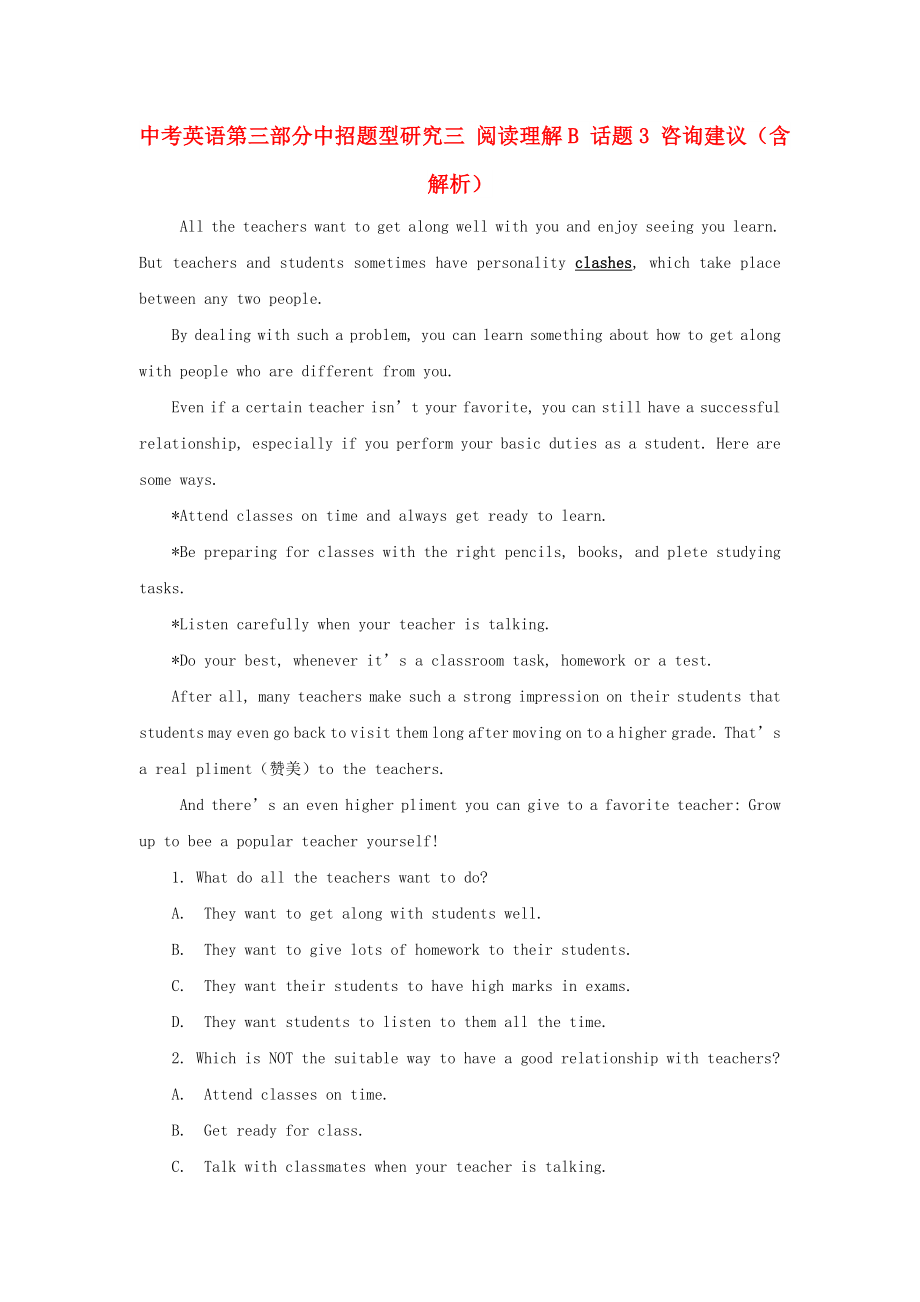《中考英語(yǔ)第三部分中招題型研究三 閱讀理解B 話(huà)題3 咨詢(xún)建議(含解析)》由會(huì)員分享,可在線(xiàn)閱讀�,更多相關(guān)《中考英語(yǔ)第三部分中招題型研究三 閱讀理解B 話(huà)題3 咨詢(xún)建議(含解析)(3頁(yè)珍藏版)》請(qǐng)?jiān)谘b配圖網(wǎng)上搜索。
1����、中考英語(yǔ)第三部分中招題型研究三 閱讀理解B 話(huà)題3 咨詢(xún)建議(含解析)
All the teachers want to get along well with you and enjoy seeing you learn. But teachers and students sometimes have personality clashes, which take place between any two people.
By dealing with such a problem, you can learn something about how to get along wi
2、th people who are different from you.
Even if a certain teacher isn’t your favorite, you can still have a successful relationship, especially if you perform your basic duties as a student. Here are some ways.
*Attend classes on time and always get ready to learn.
*Be preparing for classes wit
3�、h the right pencils, books, and plete studying tasks.
*Listen carefully when your teacher is talking.
*Do your best, whenever it’s a classroom task, homework or a test.
After all, many teachers make such a strong impression on their students that students may even go back to visit them long
4、after moving on to a higher grade. That’s a real pliment(贊美)to the teachers.
And there’s an even higher pliment you can give to a favorite teacher: Grow up to bee a popular teacher yourself!
1. What do all the teachers want to do?
A. They want to get along with students well.
B. They want
5����、 to give lots of homework to their students.
C. They want their students to have high marks in exams.
D. They want students to listen to them all the time.
2. Which is NOT the suitable way to have a good relationship with teachers?
A. Attend classes on time.
B. Get ready for class.
C. Tal
6、k with classmates when your teacher is talking.
D. Try your best to study.
3. What does the underlined word “clashes” mean in Chinese?
A. 沖突 B. 知識(shí) C. 考試 D. 尊敬
4. Which of the following is a pliment to the teachers?
A. The students are the cleverest.
B. The students finish home
7��、work well.
C. The students are impolite to teachers.
D. The students go back to visit teachers long after graduation.
5. If you grow up to bee a popular teacher, that will be _____ you can give to a favorite teacher.
A. the best gift
B. the highest pliment
C. the sweetest memory
8�、D. the strongest impression
【主旨大意】本文是一篇說(shuō)明文。介紹了學(xué)生與老師之間有時(shí)候有一些個(gè)性沖突�,學(xué)生要想和老師友好相處,必須履行自己最基本的職責(zé)�,同時(shí)還要對(duì)喜歡的老師給予贊美�。
1. A【解析】細(xì)節(jié)理解題��。題干意為:所有的老師都想要做什么��?A項(xiàng):他們想要與學(xué)生友好相處����;B項(xiàng):他們想要給學(xué)生布置很多作業(yè);C項(xiàng):他們想要學(xué)生在考試中取得高分���;D項(xiàng):他們想要學(xué)生總是聽(tīng)他們的。根據(jù)第一段第一句可知所有的老師都想要與你好好相處并喜歡看你學(xué)習(xí)����,故選A。
2. C【解析】細(xì)節(jié)理解題���。題干意為:哪個(gè)
9����、不是和老師有良好關(guān)系的恰當(dāng)方法�����?A項(xiàng):按時(shí)上課;B項(xiàng):準(zhǔn)備好上課�����;C項(xiàng):當(dāng)老師講課的時(shí)候和同學(xué)說(shuō)話(huà)����;D項(xiàng):盡自己最大的努力學(xué)習(xí)。根據(jù)第六段“Listen carefully when your teacher is talking.” 可知C項(xiàng)不符合題意����,故選C。
3. A【解析】詞義猜測(cè)題��。題干意為:畫(huà)線(xiàn)單詞“clashes”的漢語(yǔ)意思是什么�����?根據(jù)第一段大意可知�,老師們都想和學(xué)生們處好關(guān)系,但是學(xué)生和老師之間有時(shí)會(huì)有一些個(gè)性_____���,而且它存在于任意兩個(gè)人之間���。由此可推測(cè)應(yīng)該是沖突��、分歧��,故選A��。
4. D【解析】細(xì)節(jié)理解題��。題干意為:下面哪一個(gè)對(duì)老師們來(lái)說(shuō)是贊美�?A項(xiàng):學(xué)生是最聰明的
10����、;B項(xiàng):學(xué)生很好地完成作業(yè)����;C項(xiàng):學(xué)生對(duì)老師不禮貌����;D項(xiàng):畢業(yè)很長(zhǎng)時(shí)間后學(xué)生回去看望老師。根據(jù)倒數(shù)第二段“...students may even go back to visit them long after moving on to a higher grade. That’s a real pliment(贊美)to the teachers. ……很長(zhǎng)時(shí)間后��,到了一個(gè)更高的年級(jí)�����,學(xué)生們甚至回去看望老師。那才是對(duì)老師真正的贊美�����?����!庇纱丝芍狣項(xiàng)符合題意��,A�����、B��、C在文中沒(méi)有提到����。故選D。
5. B【解析】細(xì)節(jié)理解題�。題干意為:如果你長(zhǎng)大成為一名受歡迎的老師,那將是你能給一位最喜愛(ài)的老師_____���。A項(xiàng):最好的禮物���;B項(xiàng):最高的贊美����;C項(xiàng):最甜美的回憶�;D項(xiàng):最深刻的印象。根據(jù)文章最后一段可知長(zhǎng)大后自己變成一位受歡迎的老師����,這是你能給予一位喜歡的老師的更高的贊美!”故選B�。
 中考英語(yǔ)第三部分中招題型研究三 閱讀理解B 話(huà)題3 咨詢(xún)建議(含解析)
中考英語(yǔ)第三部分中招題型研究三 閱讀理解B 話(huà)題3 咨詢(xún)建議(含解析)

